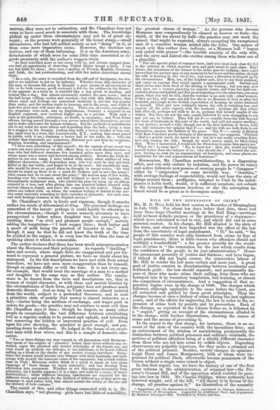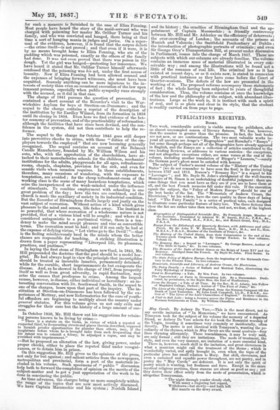HILL ON THE REPRESSION OF CRIME, * Mn. M. D. HILL
held his first session as Recorder of Birmingham in July 1839. For about ten days before that date, there had been those large Chartist meetings in the Bull Ring—meetings held without definite purpose or the presidency of a chairman— which were calculated to end in riot, and which did end in some personal contest. In his charge, Mr. Hill alluded to the state of the town, and observed how imperfect was the effect of the law from the uncertainty of legal punishment. ".If," he said, "the people of this country were only hindered from crime by fear of legal punishment, there is little reason why offenders should not multiply a hundredfold " : a far greater security for the avoidance of crime is "the veneration for the law which results from the confidence of the people in its just administration." Hence the paramount necessity of justice and fairness ; and here began, if indeed it did not 'begin sooner, the consecutive labour of Mr. Hill to render the law more certain and more just. I great part of justice consists in discriminating between accidental and deliberate guilt : the law should separate, and permanently dispose of, those who make crime their calling, from those who are betrayed into it by transitory temptation, bad training, or almost the compulsion of circumstances. And a suggestion of that separation begins even in the charge of 1839. The charges which followed, although applicable to the eases before the Court, are .all animated and guided by these great principles. Thus the charges become at once a history of crime during the last eighteen years, and of the efforts for improving the law in order to the repression of crime both by penalty and by prevention. Each of the charges, as reprinted in the volume before us is followed by a "sequel," giving an account of the circumstances alluded to in the charge, with further illustrations, showing the causes of crime and the means of preventing it. In the sequel to the lust charge, for instance, there is an account of the state of the country with the incendiary fires ; and an enforcement of the wisdom of maintaining permanently the distinction between political prisoners and ordinary criminals, the motives of political offenders being of a wholly different character from those who are led into crime by selfish objects. Degrading observances are palpably injurious, for they make a criminal out of the political prisoner. Besides, society changes its opinions : Leigh Hunt and James Montgomery, both of whom were imrisoned for political libels, afterwards became pensioners of the Crown without a single voice raised to object. In this first sequel, too, we have the history of one of the first great reforms in the administration of criminal law—the Prisoner's Counsel Bill, and of the opposition which resisted its passing into law in 1835. Mr. Charles Phillips, whose authority had deserved weight, said of the bill, "All theory, is in favour of the change, all practice against it" An illustration of the necessity • Suggestions for the Repression of Crime: contained in Charges delivered to Grand juries of Birmingham. Slipported by Additional Facts and Arguments. By Matthew Davenport Hill. Published b1 Parker and Son,
for such a measure is furnished in the ease of Eliza Fenning. Most people have heard the story of the maid-servant who was charged with poisoning her master Mr. Orlibar Turner and his
family, and who was convicted and hanged, there being at that time a sort of hanging mania in judges and juries. On a reperusal of the evidence, however, it is found that the corpus delieti —the crime itself—is not proved ; and that even if it were, it is by no means brought home to RH& Fenning, who ate of the pudding which was poisoned, exactly as the others of the family had done. It was not even proved that there was poison in the dough. Yet the girl was hanged—protesting her innocence. We have heard it stated that Mr. Orlibar Turner himself afterwards confessed that the poisoning was his act, under the first access of insanity. Now if -Eliza Fenning had been allowed counsel and the expenses of bringing forward witnesses, she must have been acquitted. Scarcely anything can be more injurious to the interests of society than even an occasional execution of the law upon innocent persons' especially: when public sympathy runs strongly with the accused, as it did in that case.
The charge of 1841 pursues the question of prevention. It contained a short account of the Recorder's visit to the Warwickshire Asylum for boys at Stretton-on-Dunsmore ; and the sequel to the charge contains a reprint of the description of the institution by Sir Eardley Wilmot, from its formation in 1818 until its closing in 1854. Even here we find evidence of the better economy of prevention' and of the practicability of reformation ; although the facilities that have since been devised, and the confidence in the system, did not then contribute to help the reformer.
The sequel to the charge for October 1845 goes still deeper into preventive checks to crime, with those "duties of the employers towards the employed" that are now becoming generally recognized. The sequel contains an account of the Belmont Candle Manufactory, founded by Mr. William Wilson and his sons, who, with the approbation of the shareholders, have attached to their manufactories schools for the children, mechanics' institutions for the adults, playgrounds for all ages, refreshmentrooms chapels chaplains, provision for the sick, and even for seaside visits when occasion requires. In these establishments, therefore, many occasions of wandering, with the exposure to temptation, are avoided ; for the cheap refreshment-room of the working class is the scene of many hazardous temptations, which seize the inexperienced or the weak-minded under the influence of stimulants. To combine employment with schooling is one great problem of the day ; here the two are combined, and the church is made the auxiliary of society in its industrial condition. But the Recorder of Birmingham dwells largely and justly on the vast subject of recreation. Without action of a kind which gives pleasure to the mind and senses, life fades away. The instinct is so powerful, that where recreation of a wholesome nature is not provided, that of a vicious kind will be sought ; and where it is considered antagonistic to a puritanical virtue, there is a tendency to make the mind accept pleasure and vice as convertible terms. The recreation must be had; and if it can only be had at the expense of defying virtue, "Let virtue go to the Devil! "—that is the feeling mischievously bred in the minds whom the better classes are responsible for teaching. A striking illustration is drawn from a paper representing Liverpool life, its pleasures, practices., and pastimes." In laying the first stone of Birmingham new Gaol, in 1845, Mr. Hill propounded the doctrine that the gaol should be a model hos pital. He had always kept in view the principle that incorrigibles should be treated as incurable lunatics, permanently detained ; while for the curable, short imprisonments do but exasperate the disease. And, as he showed in his charge of 1847, from prosperity itself as well as from great adversity, in rapid fluctuation, may arise the causes that predispose to crime. Among the largest causes however, is disease, either individual or hereditary : tut interesting conversation with Dr. Southwood Smith, in the sequel to one of the charges bears upon that part of the inquiry. 'The institution at Stretion-on-Dunsmore has been followed by the experiences of Mettray, and now Reformatories for the cure of youthful offenders are beginning to multiply about the country under general statutes. For this volume gives us not only evils and struggles for their cure but the history of a large amount of success.
In October 1850, Mr. Hill threw out his suggestions for retaining persons known to be living by crime
" There is a statute on the books, in virtue of which a reputed or suspected thief, by frequenting streets and places therein described, supposed to furnish greater opportunities for plunder than others, may, if the magistrate before whom he is brought infer from such frequenting that his intent was to commit a felony, be adjudged a rogue, and may be punished with imprisonment."
—But he proposed an alteration of the law' giving power, under proper checks, either to place the reputed thief under recogni maces or to detain him in prison.On ihis suggestion Mr. Hill gives us the opinions of the press, not only for but against; and salient articles from the newspapers, metropolitan and provincial, form a part of the materials included in his 'volume. Such specimens of ." public" discussion help both to forward the completion of opinion on the merits of the subject-matter and to get a just appreciation of the work to be done in convincing the public.
As time advances, the charges bring us more completely within the range of the topics that are now most actively discussed. We have Captain Maconochie and his system ; Norfolk Island
and its history ; the cruelties of Birmingham Gaol and the appointment of Captain Maconochie ; a friendly controversy between Mr. Hill and Mr. Adderley on the efficiency of deterrents ; the over-crowding of London; the accounts of the prisons at Munich and Valencia; the Smithfield Penitentiary at Dublin; the introduction of photographic portraits of criminals; and even Sir George Grey's Transportation Bill, at present under discussion in Parliament, comes into the charge of March 1867. These are subjects with which our columns are already familiar. The volume contains an immense mass of material illustrated in every conceivable way ; and among the illustrations will be found not a little of the romance of real life. The criminal law as it has existed at recent days, or as it exists now, is stated in connexion with practical instances as they have come before the Court of Quarter-sessions. The defects of the law, are presented in the working of it. The proposed reforms accompany these statements of fact ; the whole having been subjected to years of thoughtful consideration. Thus, the volume contains at once the knowledge of the law and the philosophy of the subject, with abundant illustrations. Large as the work is, it is instinct with such a spirit of zeal, and is so plain and clear in its style, that the student is readily carried on from page to page.



























 Previous page
Previous page